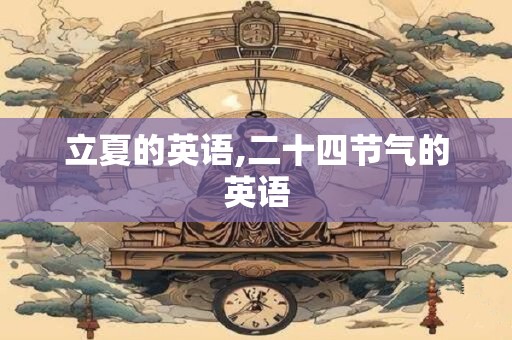As the sun climbs higher in the sky, casting its warm glow upon the world, we celebrate the arrival of the season with a special term: Lixia, or the Start of Summer. This is one of the 24 solar terms in the traditional Chinese calendar, a system that divides the year into 24 segments based on the sun's position. Here's an exploration of Lixia and the significance of the 24 solar terms.
Understanding Lixia
Lixia, which falls on or around May 5th in the Gregorian calendar, marks the official beginning of summer. It's a time when nature thrives, and the world comes alive with vibrant colors and the sound of bustling life. This term signifies the transition from spring to summer, bringing with it longer days and shorter nights.
The Origin of Solar Terms
The Ancient Wisdom
The concept of the 24 solar terms originated from ancient Chinese agriculture. Farmers relied on these terms to plan their crops, ensuring that they could make the most of the changing seasons. The terms are based on the sun's position relative to the Earth, making them an accurate reflection of the natural world's rhythms.
Significance of Lixia
Harmony with Nature
Lixia is a time for people to align themselves with nature's cycles. As the days grow longer, it's an opportunity to embrace the energy of the sun and the warmth of the season. Many traditional customs and rituals are associated with Lixia, all aimed at fostering a harmonious relationship with the environment.
Agricultural Importance
For farmers, Lixia is a crucial time. It signals the start of the summer planting season, and they take this opportunity to prepare their fields, sowing seeds and nurturing young crops. The term also serves as a reminder to manage water resources wisely, as the hot weather can lead to drought conditions.
Customs and Traditions
Gratitude and Celebration
During Lixia, people often express their gratitude for the bountiful harvests of spring and look forward to the abundant crops of summer. Festivals and gatherings are common, where communities come together to celebrate the season and share in the joy of the harvest.
Eating and Drinking
In many regions, specific foods and drinks are associated with Lixia. People might enjoy cold dishes and beverages to cool down, such as cold noodles or sweetened mung bean soup. These foods are believed to help balance the body's heat and maintain health during the hot summer months.
Health and Well-being
Embracing the Heat
As temperatures rise, it's important to take care of one's health. Traditional Chinese medicine suggests that during Lixia, individuals should focus on cooling their body and avoiding excessive heat. This can be achieved through proper diet, adequate hydration, and appropriate clothing.
Mind and Body Balance
Lixia is also a time for maintaining balance in both mind and body. Engaging in activities like tai chi, yoga, or meditation can help individuals stay centered and calm, despite the heat and hustle of the season.
Cultural Significance
Art and Literature
The 24 solar terms, including Lixia, have deeply influenced Chinese art and literature. Poets and artists often draw inspiration from these terms, creating works that reflect the beauty and essence of each season. These cultural expressions serve as a testament to the importance of the solar terms in Chinese heritage.
Modern Relevance
While the agricultural significance of the solar terms may have diminished in modern society, their cultural and spiritual relevance remains strong. Many people still observe the traditions associated with Lixia and other terms, finding meaning and connection in these ancient practices.
Looking Ahead

The Circle of Life
As Lixia ushers in the summer season, it also reminds us of the cyclical nature of life. Each solar term represents a stage in the natural cycle, and by observing them, we can gain a deeper appreciation for the changing seasons and the interconnectedness of all living things.
In conclusion, Lixia and the 24 solar terms are more than just markers of time; they are a celebration of life, nature, and the enduring wisdom of our ancestors. By embracing these terms, we can find harmony with the world around us and cultivate a deeper understanding of our place within it.
